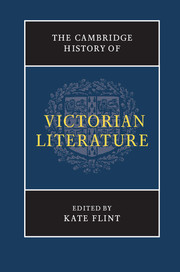Book contents
- Frontmatter
- Introduction
- PART I AUTHORS, READERS, AND PUBLISHERS
- PART II WRITING VICTORIA’s ENGLAND
- PART III MODES OF WRITING
- 7 Lyric and the lyrical
- 8 Epic
- 9 Melodrama
- 10 Sensation
- 11 Autobiography
- 12 Comic and satirical
- 13 Innovation and experiment
- 14 Writing for children
- PART IV MATTERS OF DEBATE
- PART V SPACES OF WRITING
- PART VI VICTORIAN AFTERLIVES
- Select bibliography
- Index
9 - Melodrama
from PART III - MODES OF WRITING
Published online by Cambridge University Press: 28 March 2012
- Frontmatter
- Introduction
- PART I AUTHORS, READERS, AND PUBLISHERS
- PART II WRITING VICTORIA’s ENGLAND
- PART III MODES OF WRITING
- 7 Lyric and the lyrical
- 8 Epic
- 9 Melodrama
- 10 Sensation
- 11 Autobiography
- 12 Comic and satirical
- 13 Innovation and experiment
- 14 Writing for children
- PART IV MATTERS OF DEBATE
- PART V SPACES OF WRITING
- PART VI VICTORIAN AFTERLIVES
- Select bibliography
- Index
Summary
From grand opera to soap opera, from Gothic and nautical to domestic, urban, and imperial, from stage to screen, melodrama has been a dominant shaping force of modernity for over two hundred and fifty years. We live, still, within its aesthetic regime in the twenty-first century. Ignored as bad drama until its rehabilitation began in the 1960s, melodrama is now both widely acknowledged as an important dramatic genre, with its own coherent set of conventions, and also understood more broadly as a mode of apprehension, behaviour, and social action.
In its most literal definition, melodrama consists of a combination of music and drama in which passages of music either alternate with passages of dramatic speech or subtend them almost continuously and in which speech and action are interrupted by moments of static pictorial composition, the tableaux. Thus melodrama is an organized audio-visual field, dialectically working back and forth between music and pictures, music and speech, movement and stasis, sound and silence. As Juliet John argues, ‘the emotional economy of melodrama is best figured as a series of waves’; as Martin Meisel puts it, melodrama offers ‘a style of punctuated discontinuity, visually marked’. Music and tableaux provide punctual markers of the narrative structure as well as guides for the audience’s affective response; they articulate its shifts in mood or tone as the drama moves between high and low plots, terror and comedy, complications and resolutions, absorption and shock.
- Type
- Chapter
- Information
- The Cambridge History of Victorian Literature , pp. 193 - 219Publisher: Cambridge University PressPrint publication year: 2012
- 17
- Cited by

